|
During the past year, CHESS made a significant investment in new detectors, dramatically expanding CHESS's ability to support diverse research programs. In one particularly striking example, CHESS scientist Arthur Woll and collaborators from Brookhaven National Laboratory (BNL) and Australia's national science agency, CSIRO, commissioned the new Maia detector during the March run. The test images they acquired from some pressed flowers are not only aesthetically beautiful, but also inspired experts in plant biology to venture into the synchrotron. In a similar theme, instrumentation developed at D-line, which supports GISAXS, GIWAXS, and XRR in one hutch, enabled researchers from Cambridge University to identify processing pathways for future high-efficiency all-polymer solar cells. I invite you to read the news item below on the Maia detector and the all-polymer solar cell for more details.
|
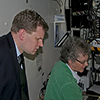 
On Tuesday, April 1st, Congressman Dan Maffei (24th Congressional District of New York state - region near Syracuse, NY) toured CHESS and visited with CHESS users, graduate students, and post-docs... more »
|
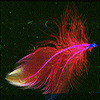
Over the course of two weeks this past March, scientists from three laboratories commissioned CHESS's most recent purchase, a 384-sensor, energy-dispersive detector known as "Maia". The large number of individual sensors enables much higher count-rates than prior generations of detectors with the same functionality... more »
|
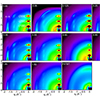 
Bulk hetero junctions (BHJ) constitute a promising route for low-cost solar cells based on semiconducting polymers. The crucial property of a BHJ is a self-organized interspersed network of donor and acceptor materials that transport the charge produced by the absorption of sunlight... more »
|
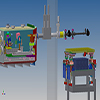 
CHESS C1 station has been modified to improve beam delivery for low energy x-ray experiments. The work was carried out by CHESS operators Chris Whiting, John Conrad, and Engineer Tom Krawczyk with supervision by Operations Manager Chris Conolly & Vacuum Group Leader Bob Seeley, responding to a request by Scientist Ken Finkelstein... more »
|
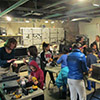 
Our science outreach team, Xraise, is tapping into the e-waste stream to provide a gateway to STEM for kids. Printers, cassette recorders, and DVD players are chock full of parts-motors, lights, gears, switches, buttons, pulleys, belts, liquid crystal displays, and speakers-that employ standards-worthy concepts of physics, mathematics, and engineering... more »
|
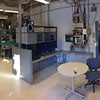 
2013 witnessed a number of improvements to the G-line area and user equipment. Perhaps the most conspicuous change is a reorganization of the user space, primarily to improve access and usability of the G2 and G3 areas, especially for large groups. Among the changes are the creation of a "G3 annex" space... more »
|
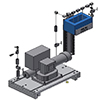 
A technology developed by Cornell scientists that prepares proteins for X-ray crystallography has made its way into the world marketplace: ADC Inc., a maker of scientific instruments located just outside Ithaca, has licensed the high-pressure cryocooler, called HPC-201, and has just fulfilled its first order to a research center in Japan. The licensing agreement is ADC's first with Cornell. Company president Alex Deyhim says the product is garnering interest from potential buyers, and he's thrilled to showcase the "amazing work" of Cornell scientists... more »
|
|
|








